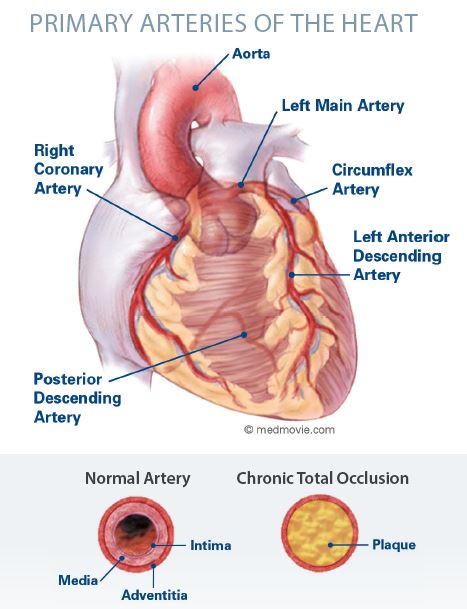Chronic Total Occlusion
Exceptional care for completely blocked coronary
arteries
If you've been diagnosed with a chronic total occlusion (CTO) or a completely blocked coronary artery, turn to the heart experts at The Christ Hospital. We're nationally recognized for heart care and draw patients for CTO treatment from throughout the Tristate area and beyond.
Our care team offers all types of treatment for CTO and is among the nation's leaders in CTO percutaneous coronary intervention (PCI) care. CTO PCI restores normal blood flow to your heart without open-heart surgery. That means you can feel better and return to your favorite activities sooner. Our expertise and experience with the procedure enable us to successfully treat even the most complicated CTO cases.
For unparalleled CTO care, trust the cardiology team at The Christ Hospital, Greater Cincinnati's Heart HospitalSM. Call us to speak with an experienced heart nurse about scheduling an appointment or to learn more about CTO care.
What is a chronic total occlusion (CTO)?
A CTO occurs as a result of coronary artery disease. When fatty deposits or plaque build up in the arteries (coronary atherosclerosis) — it can limit the flow of blood to your heart. A CTO refers to a coronary artery that's completely blocked for three months or more.

Unlike a heart attack, which occurs when a coronary artery is blocked suddenly, CTOs develop over time. As a result, your heart may grow new blood vessels that re-route blood around the blockage. These "collateral" vessels supply some of the blood your heart needs to function and may prevent a heart attack. However, they are not normal blood flow.
CTO risk factors
 CTOs are common. They occur in as many as one in five people with significant coronary artery disease. Common CTO risk factors include:
CTOs are common. They occur in as many as one in five people with significant coronary artery disease. Common CTO risk factors include:
CTO symptoms
The limited blood flow to your heart causes CTO symptoms, although not all patients feel them. Symptoms typically develop over weeks or months. The most common include:
Diagnosing CTO: Coronary angiography
If you have symptoms, it's important to bring them to your doctor's attention. To make a diagnosis, your doctor will talk with you about your medical history, perform a physical exam, and may also order one or more medical tests.
Coronary angiography is the standard test for diagnosis. In this procedure, doctors thread a small tube (called a catheter) through a blood vessel in your wrist or groin up to your heart. They then inject a special dye that they can see on X-rays. These images allow doctors to spot any blocked blood vessels.
CTO treatment
The Christ Hospital offers a full range of treatment options. Doctors determine which treatment is best for you based on factors such as your symptoms, the number and size of the blood vessels involved, their location, and your overall health. Our expert team will personalize your care and work to improve your quality of life.
Medication
Medication is the most common CTO treatment and usually what doctors try first. Several medicines may help restore blood flow and ease your symptoms. However, if taking them doesn't provide enough relief or proves too difficult, doctors consider other options.
Percutaneous coronary intervention (PCI)
Improved technology has made PCI, commonly known as coronary angioplasty, an option in many cases, even in CTO. PCI is a minimally invasive procedure. It may be less traumatic for patients than surgery and offers a quicker recovery.
An experienced interventional cardiologist (a heart doctor trained in catheter-based procedures) performs the PCI while you're sedated (asleep). During the treatment, the cardiologist inserts a thin wire into an artery in your wrist or groin, and, then, with the aid of imaging technology, guides the wire to your heart and through the blockage. The doctor inflates a tiny balloon in the blockage to help break apart the plaque, pushes it against your artery walls, and then places a tiny, metal mesh tube called a stent in the area to help keep it open.
Most patients go home the same day as treatment. Some report feeling relief from their symptoms right away. For others, improvement may take a few days or weeks.
Success rates for CTO patients treated with PCI at The Christ Hospital are in the 85 to 90 percent range — far beyond the average at less experienced facilities.
Coronary artery bypass graft (CABG) surgery
For many years, CABG surgery was the main treatment for CTOs. During this open-heart operation, a heart surgeon removes part of a healthy vein or artery from your body and attaches it to your heart above and below the CTO. The procedure allows blood to flow around the blockage and supply your heart with needed oxygen and nutrients.
CABG surgery is effective. However, because of the risks of heart surgery, it may not be the best option for some patients.
Recovering from CTO treatment
After treatment, it's important to protect your heart health. Steps you can take include:
Avoiding tobacco products
Being physically active
Controlling your blood pressure and cholesterol
Eating a heart-healthy diet
Managing your weight
Complete Coronary Revascularization in Complex Higher-Risk and Indicated Patients Program
The Christ Hospital created the Complete Coronary Revascularization in Complex Higher-Risk and Indicated Patients Program (CHIP) to treat complex coronary artery disease and CTOs with pioneering care. Often, we help patients who've been told they have no treatment options.
Our CHIP team of world-class physicians includes heart imaging specialists, interventional cardiologists, heart surgeons, and others. They're among the most skilled and experienced cardiology professionals in the nation. Together, they evaluate your treatment options and develop a plan to provide individualized care for your unique situation.
You may wish to consult our CHIP team if you:
Are seeking a second opinion
Have been told there are "no options" to treat your blocked heart arteries
Have been told you don't qualify for CABG surgery due to your risk factors
Prefer to avoid open heart surgery.
Contact us
If you're concerned about your symptoms or would like more information about CTO treatment at The Christ Hospital, please call our nurse navigator at 513-564-2447 to schedule an appointment. We welcome new patients and those seeking second opinions.